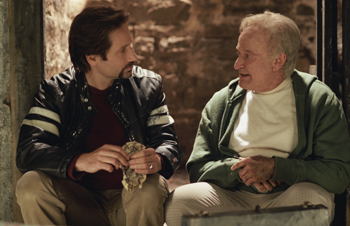![[Metroactive Movies]](/movies/gifs/movies468.gif)
[ Movies Index | Show Times | Silicon Valley | Metroactive Home | Archives ]
X-Files Morks the Spot: David Duchovny, alien hunter, and Robin Williams, famous TV alien, prove that there is no intelligent life on Earth in 'House of D.'
D for Despair
Robin Williams sinks to a new low in Duchovny/Leoni vanity project 'House of D'
By Richard von Busack
DAVID DUCHOVNY and Téa Leoni are reputed to be two of the realest people in the industry. He has a dry, earthy sense of humor; she also enjoys a rep for maximum likability. It was tragically inevitable that the two of them would turn up in a movie like House of D. Movies this bad don't happen to bad people; something protects them—untrustworthiness, common sense or maybe cynicism.
House of D is short for House of Detention, and that's exactly what the theater felt like. A coming-of-age memoir, the film begins promisingly with Duchovny's Tom Warshaw briskly pedaling around Paris on his bicycle at night. Warshaw is in a hurry because he's missed his son's bar mitzvah-age birthday. His wife and neighbors are waiting for him, ready to dress him down. But Warshaw stops everything to tell a story of his own 13th birthday and the secrets that have been fermenting within him every since.
As played by Anton Yelchin, the young Warshaw grew up a fatherless boy in New York in 1973. His mother (Leoni) is a manic-depressive pill-popper. By day, Tom attends Catholic high school, where Frank Langella serves as the sardonic headmaster. In the afternoons, he runs errands for a meat store with his bosom pal Pappass (Robin Williams). Since Pappass is brain-damaged, the part gives Williams a chance to riff, pull faces and tell every schoolyard joke he knows, including the one about I.P. Freely. At other times, Warshaw receives advice from Lady, a prisoner up in the Greenwich Village House of Detention, who shouts out to the street from a high window. As the prisoner, Erykah Badu gives the movie its few instances of authenticity. Mostly the advice Warshaw needs is how to handle the pangs of first love. He has fallen for an uptown girl named Melissa (Zelda Williams) who lives in a penthouse.
The costumes are softer and more exotic than is customary in '70s memoirs; there is much more velour, velvets and corduroy on the actors than polyester. The soundtrack is soft, too, including the Allman Brothers' "Melissa" and the Doobie Brothers' "China Grove" in the dance sequence. Elton John's "Harmony" scores a necking session. It is annoying to have this music's ready-made associations plastered all over a movie of such noteworthy phoniness. I guess we're supposed to think it is the combination of Pappass' lowbrow comedy and the romantic street advice of Baud's Lady that saves Tom from his toxic mother. But since Tom becomes an artist, it would have been interesting to see what art had meant to him. The only art he does in his teens is an imitation R. Crumb caricature of a teacher.
As for Williams, he's at an all-time low, a wild man on autopilot. There could be an entire book about comedians drawn to playing the mentally challenged. All actors love such parts because they don't have to respond to anyone else. They don't have to react or interact. They can just thrash. In House of D, Williams' desire to overmaster the stage by playing a moron is combined with a comedian's natural aggressiveness. So you have moments in House of D that are as hard to watch as anything ever put in a movie.
[ Silicon Valley | Metroactive Home | Archives ]
![]()

Photograph by Larry Watson
House of D (PG-13; 96 min.), directed and written by David Duchovny, photographed by Michael Chapman and starring Duchovny, Téa Leoni and Robin Williams, opens Friday at selected theaters.
Send a letter to the editor about this story to letters@metronews.com.
From the April 27-May 3, 2005 issue of Metro, Silicon Valley's Weekly Newspaper.